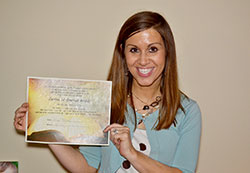Catholic schools bring people to the Church with help of UCA funds

Tristan McGill poses with a certificate welcoming her into full communion with the Catholic Church on April 19 after receiving the sacraments of Eucharist and confirmation at the Easter Vigil Mass at St. Barnabas Parish in Indianapolis. (Submitted photo)
By Natalie Hoefer
Tristan McGill attended Holy Family School in New Albany and Our Lady of Providence Jr./Sr. High School in Clarksville.
In college, she was a substitute teacher at Roncalli High School and Bishop Chatard High School, both in Indianapolis. She now teaches full time at Roncalli.
But up until this Easter, 29-year-old McGill was not Catholic—officially.
“I’ve been the most Catholic a non-Catholic could be,” she said of her journey to the Church.
She looks to her experience at Catholic schools as the main path that led her to join the Church—schools made possible in part by funds from the United Catholic Appeal: Christ Our Hope annual campaign (UCA).
“If you’re immersed in [the faith] in a Catholic school, it just becomes part of who you are,” said McGill. “That was instrumental in my own decision.”
Her journey actually started in 1981, four years before she was born, when her mother, a Methodist, started teaching at Our Lady of Providence.
“She realized pretty quickly that, even though she wasn’t Catholic, she saw the benefit of a Catholic education and thought, ‘This is where my kids have to go.’ ”
Raised in the Methodist faith, McGill said when it came time to decide on where she wanted to teach, her first choice was at a Catholic school.
“My mom is still assistant principal at Providence,” she said. “Her having been there for so long, I knew that it was something you didn’t get into for the money, but [for] the mission of the Catholic schools. What’s going on there is so special.”
McGill, who teaches English and speech and coaches Roncalli’s speech team, defines Catholic schools with words like “family,” “community” and “caring.”
“It’s not just about passing the test or getting the grades or getting the scholarships,” she explained. “It’s all about the people that these kids are becoming.”
Of course, McGill said, the faith component of Catholic schools “is huge.”
“I took it for granted as a child that I prayed every day in school, that I was allowed and encouraged to pray on my own, that I was taught to memorize the [Apostles] Creed and other prayers.
“Those things become a part of who you are, even as kids. Sometimes I think the kids don’t even know it’s happening to them, but those things become a part of who you are.”
McGill knew that when she had children, she wanted them to attend Catholic schools, even if they weren’t Catholic.
Her husband Mickey, a non-Catholic, didn’t understand.
“He didn’t dislike Catholic schools,” she said. “But he thought it was a lot of money. It’s hard to explain to someone who hasn’t had that [Catholic school] experience.
“Now through me, and through other people we know, he completely agrees, and he gets it. He’s the one saying to other people, ‘You might not get it, but it’s real. There’s something special about these schools.’ ”
So, after many years attending and teaching in Catholic schools, McGill has decided to “make it official.”
At the Easter Vigil Mass at St. Barnabas Church in Indianapolis on April 19, she received her first holy Communion and was confirmed in the Catholic faith.
Her 1-year-old son, Murphy, was baptized, too.
“My [3-year-old] daughter [Quinn] was baptized in the United Methodist Church,” McGill said. “That was when I really started thinking about my children and what do I want for them.”
So she and Mickey started going to church at St. Barnabas as a family.
While Mickey did not join the Church this year for the practical purpose of watching the children while she attended the Rite of Christian Initiation of Adults classes, she said, “We have every intention of him coming into the Church in the next few years.”
McGill said she is well aware of the benefits that Catholic schools receive from the United Catholic Appeal: Christ Our Hope funds.
While the benefits of those funds to students of Catholic schools are obvious, she said, those without children in Catholic schools reap the benefits, too.
“Those kids in Catholic schools become part of the community,” she said. “You can look at statistics at the kids that come out of Catholic schools, the types of scholarships they receive, the things they’re doing when they graduate—everyone benefits from what goes on here at a Catholic school. It’s not just the ones who attend.”
And in some cases—like McGill’s—it’s through a Catholic education assisted by UCA funds that others are brought to the faith.
“Had I just stumbled across Catholicism, or if I just knew some things about it and liked the tradition, I don’t know if I would have joined the Church,” McGill said.
“But it’s so much a part of who I am now after being so immersed in it at Catholic schools. I feel so well-versed in the Bible and the prayers and the traditions.
“It’s one of those things that just feels right. It feels like what I’m meant to become.”
(For more information about the United Catholic Appeal, log on to www.archindy.org/uca or call the Office of Stewardship and Development at 317-236-1425 or 800-382-9836, ext. 1425.) †
